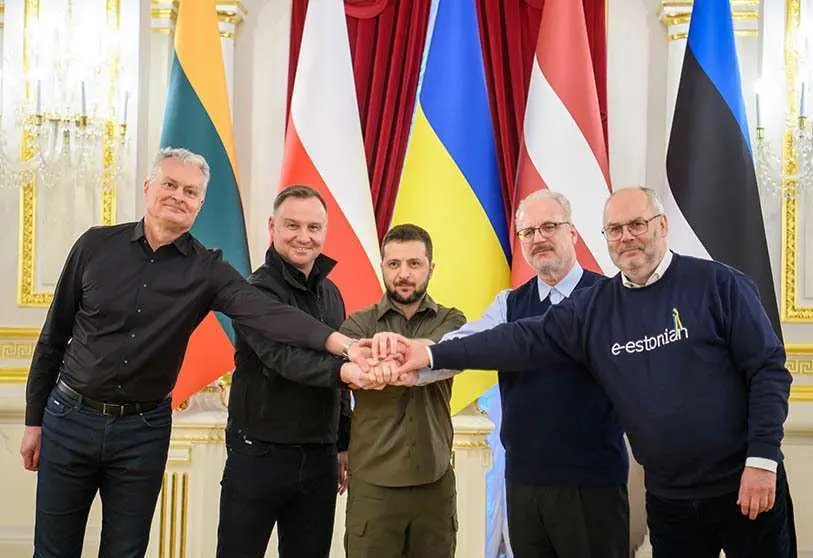Baltic leaders and Polish president support Zelenski in Kiev

German President Frank-Walter Steinmeier was to visit Kiev with his Polish, Estonian and Lithuanian counterparts. The German head of state had in mind the idea of "sending a strong signal of European solidarity with Ukraine" once the attacks by Russian troops near the capital were over. Steinmeier seemed willing, but was met with a last-minute refusal from Volodymir Zelensky, who refused to meet with him if he visited Kiev.
"We know about his close relations with Russia. At the moment he is not welcome. We'll see if that changes in the future," a Ukrainian diplomat told the German daily Bild. This criticism had already been advanced by the Ukrainian ambassador to Germany, Andrij Melnyk, on the grounds that the German president had been a close ally of Moscow during his time as foreign minister in the cabinet of the social democrat Gerhard Schröder, now chairman of the board of directors of the Russian oil company Rosneft.
Steinmeier acknowledged the mistake and offered a 'mea culpa'. "We clung to bridges that Russia no longer believed in, and which our partners warned us about. We failed to build a common European home. I did not believe that Vladimir Putin would embrace the complete economic, political and moral ruin of his country for the sake of his imperial madness," he said. But it was too late for self-criticism.

Without the presence of the German president, the leaders of Poland, Estonia, Latvia and Lithuania met with Ukrainian President Volodymir Zelenski in Kiev on Wednesday to discuss new ways to help the civilian population, hard hit since the beginning of the invasion, as well as new strategies for providing military assistance to the Ukrainian army.
Poland's Andrzej Duda, Estonia's Alar Karis, Latvia's Egils Levits and Lithuania's Gitanas Nausėda met last night in the Polish town of Rzeszów, close to the Ukrainian border, to catch a train to the capital. The programme of the visit was not leaked for security reasons, but on Wednesday morning they travelled to the towns of Irpin and Borodyanka to witness first-hand the massacre committed by Russian forces. They were accompanied by the head of the Ukrainian government, Denys Shmyhal.
"Scars of cruelty and war are everywhere. Remains of houses, churches, shops, bridges. Ukraine needs, and deserves, a recovery plan, a kind of Marshall Plan, which once helped Western Europe recover from WWII," the Latvian president tweeted. "The horrors of the war that Ukraine has suffered could not have been committed by human beings. The creatures that did it do not deserve that name, this is a conscious, targeted, extremely brutal annihilation of the Ukrainian nation," Nausėda moved, "Ukraine will resist. The truth will win!".
Zelenski held a meeting in Kiev at the end of March with the presidents of the Estonian, Latvian and Lithuanian parliaments, and is now receiving the respective heads of state in a visit that other leaders have already made in recent days.
The President of the European Commission and the EU High Representative for Foreign Affairs and Security Policy, Ursula Von der Leyen and Josep Borrell, took the baton from the President of the European Parliament, the Italian Roberta Metsola. Meanwhile, British Prime Minister Boris Johnson did the same in a surprise visit that has been praised and dubbed 'opportunistic' in equal measure by the British press.

The group visit came a day after US President Joe Biden and Estonian Prime Minister Kaja Kallas described Russia's crimes in Ukraine as "genocide", a term that French President Emmanuel Macron, who is seeking re-election to the Elysée in two weeks' time, avoided using. "What we can say with certainty is that the situation is unacceptable and that these are war crimes," said a cautious Macron, whose statements were "disappointing" to Ukrainian foreign ministry spokesman Oleg Nikolenko.
The leaders of four NATO member states have closed ranks with Ukraine in a historic context for the country, as the Polish president's advisor, Jakub Kumoch, acknowledged. This gesture, together with the recent rapprochement of countries such as Sweden and Finland, which are considering joining the Atlantic Alliance as a result of Russian aggression, has strengthened an organisation that seems to have been revived against all odds.
Part of the talks between Zelenski and his Baltic and Polish counterparts have focused on alleged war crimes committed by the Russian military on Ukrainian soil, including the indiscriminate killing of civilians in towns such as Bucha and Borodyanka. The allies will support the investigation, which has already begun under the umbrella of the International Criminal Court.
Без додаткової зброї ця війна перетвориться на нескінченну криваву лазню, що поширюватиме нещастя, страждання та руйнування. Маріуполь, Буча, Краматорськ – список буде продовжено. Ніхто не зупинить Росію, крім України з важкою зброєю. #ArmUkraineNow pic.twitter.com/b1LlRmjOYk
— Володимир Зеленський (@ZelenskyyUa) April 13, 2022
Zelenski assured Estonian MPs that Russia had used phosphorous bombs during the invasion, but provided no evidence. The former actor and comedian, still playing the role of statesman, does not cease his calls for armaments from the West: "Without additional weapons, this war will turn into an endless bloodbath that will sow misery, suffering and destruction. Mariupol, Bucha, Kramatorsk: the list goes on. No one will stop Russia except Ukraine with heavy weapons".
In a video posted on his Twitter account, Zelenski listed the needs of the Ukrainian army in this new phase of the invasion: "155 millimetre artillery, 152 millimetre artillery shells, BM-30 multiple launch rocket system (Soviet-made), armoured vehicles, T-72 tanks, S-300 air defence systems and military aircraft".
The allies are strengthening relations with Ukraine as Russia prepares a major offensive in the east of the country after failing in the vicinity of the capital in the face of Ukrainian resistance. The Kremlin is concentrating its forces in the Donbas region, where Moscow-allied separatists and Ukrainian forces have been fighting since 2014, a region they want to amputate from Ukraine as they did with the Crimean peninsula.










